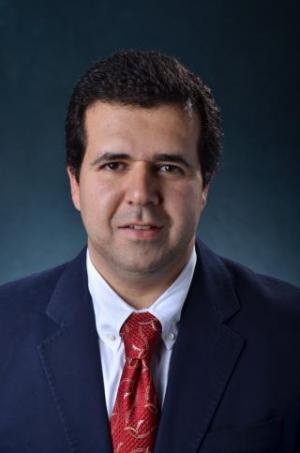Mahmoud I. Hussein
University of Colorado-Boulder
Seminar Information

Wave motion lies at the heart of many disciplines in the physical sciences and engineering. For example, problems and applications involving light, sound, heat, or fluid flow are all likely to involve wave dynamics at some level. In this work, we consider strongly nonlinear wave propagation in elastic solids, although the theory presented is in principle applicable to other types of waves such as waves in fluids, gases, and plasma.
We investigate a thick elastic rod admitting longitudinal wave motion. In the linear limit, this rod is dispersive due to the effect of lateral inertia. The nonlinearity is introduced through either the stress-strain relation and/or the strain-displacement gradient relation. Using a theory we have developed earlier and demonstrated on thin rods and beams, we derive an exact nonlinear dispersion relation for the thick rod.
The derived relation is validated by direct time-domain simulations, examining both instantaneous dispersion (by direct observation) and short-term, pre-breaking dispersion (by Fourier transformations). The study is then extended to the analysis of harmonic generation and a special case of the theory is shown to provide, also exactly, the dispersion of the generated harmonics without a prior knowledge of the solution as a function of space and time. This demonstrates a fundamental unification between the phenomena of dispersion and harmonic generation in nonlinear waves. Finally, we examine a continuous thin rod with a periodic arrangement of resonators (nonlinear elastic metamaterial) or material properties (nonlinear phononic crystal). For this problem, we combine the theory described above with a standard transfer-matrix formulation to obtain an approximate band structure that accounts for the nonlinearity prescribed in the model.
Mahmoud I. Hussein is the Alvah and Harriet Hovlid Professor at the Smead Department of Aerospace Engineering Sciences at the University of Colorado Boulder. He holds a courtesy faculty appointment in the Department of Physics and an affiliate faculty appointment in the Department of Applied Mathematics, and he serves as the Engineering Faculty Director for the Program of Exploratory Studies. He received a BS degree from the American University in Cairo (1994) and MS degrees from Imperial College, London (1995) and the University of Michigan‒Ann Arbor (1999, 2002). In 2004, he received a PhD degree from the University of Michigan, after which he spent two years at the University of Cambridge as a postdoctoral research associate.
Dr. Hussein’s research focuses on the dynamics of materials and structures, especially phononic crystals and metamaterials, at both the continuum and atomistic scales. His research considers areas that range from vibrations and acoustics of engineering structures and passive flow control to lattice dynamics and thermal transport in semiconductor-based nanostructured materials. His studies are concerned with physical phenomena governing these systems, associated theoretical and computational treatments, and analysis of relevant phenomena such as dispersion, resonance, dissipation, and nonlinearity. His team also conducts experiments to support some aspects of the theoretical work.
Dr. Hussein received a DARPA Young Faculty Award in 2011, an NSF CAREER award in 2013, and in 2017 was honored with a Provost’s Faculty Achievement Award for Tenured Faculty at CU Boulder. He has co-edited a book titled Dynamics of Lattice Materials published by Wiley. He is a Fellow of ASME and has served as an associate editor for the ASME Journal of Vibration and Acoustics. In addition, he is the founding vice president of the International Phononics Society and has co-established the Phononics 20xx conference series which is widely viewed as the world’s premier event in the emerging field of phononics.
